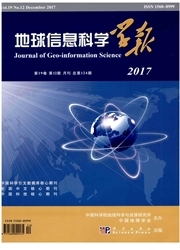

 中文摘要:
中文摘要:
Web环境下分布着大量的地理分析模型资源,但模型的异构性限制了对现有地理分析模型的共享和重用。本文立足于地理分析模型自身研究的需要,论述了标准化和形式化方法在异构地理分析模型共享和重用中的重要意义,分析地理分析模型元数据的研究现状,设计地理分析模型元数据的标准框架,并提出利用XMLSchema技术表达模型元数据标准框架结构的方法,从而实现了语法和结构层次上的标准化。提出知识本体的语义映射模型,即利用本体语言对地理分析模型元数据进行形式化表达,而在语义层次上将各模型元数据进行映射。最后结合地理分析模型共享门户的应用实例,研究了在该门户中实现异构地理分析模型标准化和形式化的体系架构,为Web环境下异构地理分析模型的共享和重用提供新的思路。
 英文摘要:
英文摘要:
There are lots of geo-analysis model resources in the Web. However, the heterogeneity of these existing models has limited their sharing and reuse. Though the mature network technology can provide strong support to the sharing and reuse of the heterogeneous geo-analysis models, the study of geo-analysis models is relatively stagnant. On one hand, the standard of the metadata for models still hasnt formed. On the other hand, the semantic heterogeneity exists in spite of following an united standard. In order to meet the needs of the development of heter- ogeneous geo-analysis models, this paper proposes a method to standardize and formalize the existed heterogeneous geo-analysis models . Firstly, based on the status of the metadata for the geo-analysis models, this paper designs a standard framework of metadata for the geo-analysis models and makes use of XML Schema to describe this stand- ard framework, which satisfies the standardization in the syntactic and structural level. The standard framework is comprised of section, compound element and data element. The data element is the basic unit to build the frame- work, and it can be described by several attributes. The compound element is made up of the data elements and the other compound elements. The section is the aggregation of related compound elements and data elements. Secondly, it presents a semantic mapping model on the basis of ontology because of the limitation of XML Schema in semantics. XML Schema is good at describing the structure of the XML document, while ontology places emphasis on the expression of semantic information. The domain ontology includes the concepts of the domain and the re- lations between the concepts, which are called the sharing ontology in this paper. For metadata for geo-analysis models, the local ontology will be built according to the sharing ontology. At the same time, the different words in the two metadata documents which in fact express the same concept will be identified through respective local ontology. This model app
 同期刊论文项目
同期刊论文项目
 同项目期刊论文
同项目期刊论文
 期刊信息
期刊信息
